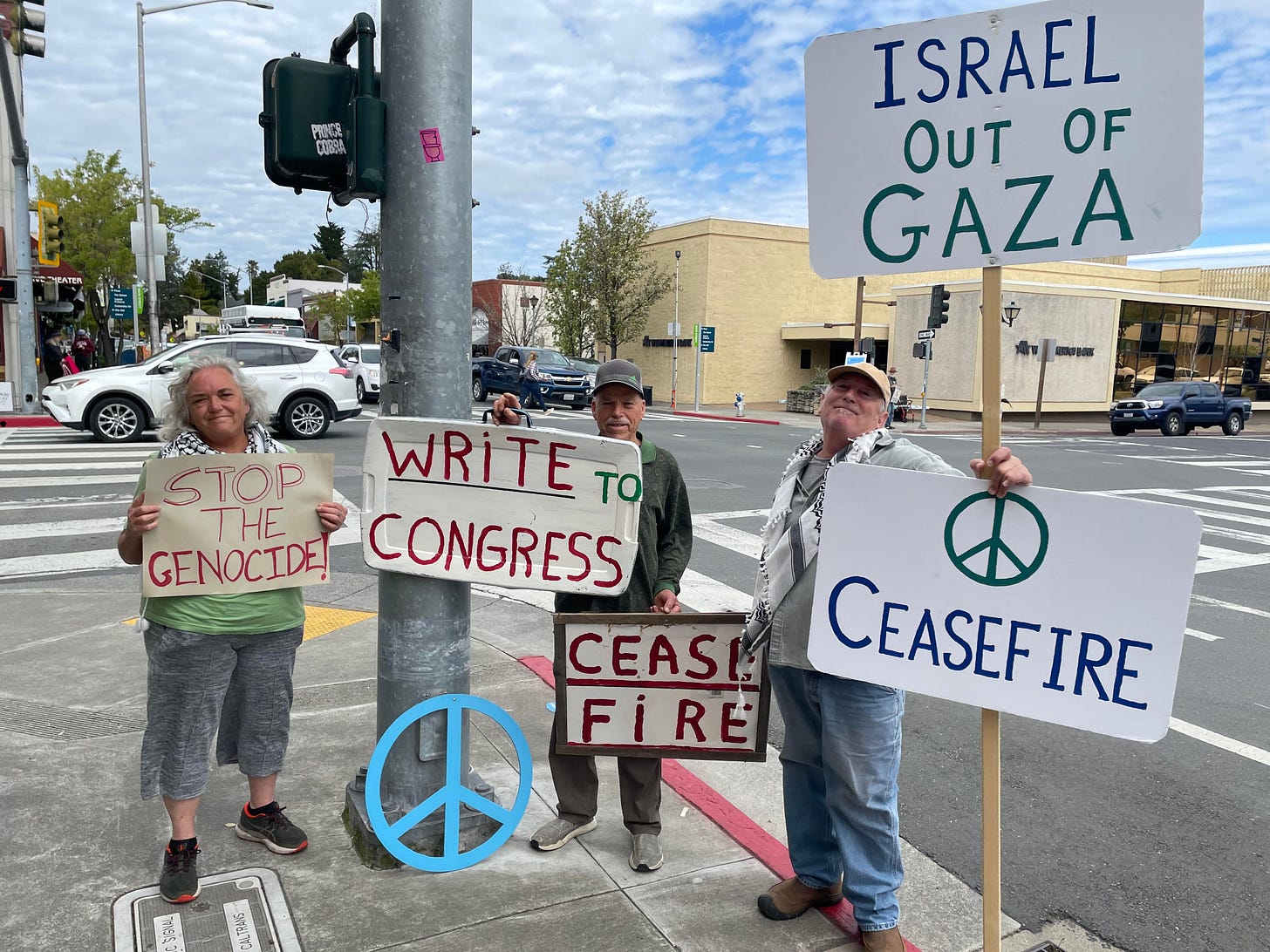What happened to the Gaza Ceasefire resolution?
After being pushed from meeting to meeting, the Gaza ceasefire resolution was withdrawn from the agenda at the request of its authors

Sebastopol’s proposed Gaza Ceasefire Resolution, which called for an immediate ceasefire and a return of the hostages, seemed like a slam dunk for a town that calls itself Peacetown. But month after month, supporters were surprised and frustrated to see it listed last on the Sebastopol City Council agenda, which meant it would most likely not be heard and pushed to the next council meeting—which is exactly what happened.
At the April 2 council meeting, when the resolution was pushed forward to the next meeting once again, the response was particularly fractious—with chanting and sign-waving and one pro-Israel speaker seizing the public comment mike briefly.
Then on Friday morning, April 12, the resolution was removed from the agenda by its sponsor, Vice Mayor Stephen Zollman, at the request of the committee that composed the resolution.
The reason was that they were concerned that it might not pass—and that its failure might impact the success of similar resolutions at other city councils in the county.
“This was an intentional choice that we made,” said Elena Lev, one of the committee members. “Myself and some other organizers, including Una Glass, the former mayor, have been working to pass a ceasefire resolution in Sebastopol. And after multiple months of talking with council members and attending the city council meetings, where it was repeatedly the last item on the agenda and it wasn't heard and kept being pushed to the next meeting, we were still uncertain about the other councilmembers’ positions on the resolution,” she said.
“We wanted to put a resolution on the agenda that had the highest likelihood of passing and we weren't certain of the councilmembers’ positions, and that felt like a precarious situation to be in for such an important humanitarian issue,” she said.
Asked directly if it had been withdrawn because, if it failed, it would damage ceasefire attempts elsewhere, Lev said. “Yes, that was part of the consideration.”
“There are other ceasefire resolutions up for consideration in other parts of the county,” she said, “and these agitators and opposition are using the failed ceasefire resolutions as evidence of their divisiveness, when in reality these situations are much more nuanced, such as situations like ours, where there was uncertainty.”
Vice Mayor Zollman, an army veteran, who put the ceasefire resolution on the agenda in the first place, explained why he did so.
“This has always been about stopping the killing of innocent women and children on both sides,” he said. “I was contacted by residents and they put me in touch with a few local businesses, who did not want to be identified. They wanted to see if we could pass a resolution similar to Cotati's. A longtime friend, Rabbi Irwin Keller of Cotati, facilitated Cotati's. He wrote a letter individually in support of ours, where he stated this situation has triggered many past traumas. My hope is that when situations like this occur in the future that we approach them with a trauma-informed lens and with an understanding that all lives are vital.”
Zollman also said the resolution was pulled so that the council could concentrate on important local issues like the budget.
“In the meantime, we must straighten out our finances,” he said, “and that means providing a welcoming community that embraces all races, religions, ethnicities, sexual orientations and gender identities. Visitors who feel and experience that will continue to enjoy time here and will want to continue investing in our community. I wish all well.”
For some, the heated debate over the ceasefire resolution indicated the need for some kind of community conversation about the issue.
“It just became apparent that it was getting to be very contentious in the community,” said former councilperson Una Glass. “People needed to understand more about the issue than was going to happen in a city council meeting, with people getting agitated with each other. So it seemed like it was a good time to just pull back and for the community to get engaged with itself and educate everybody about the issue and talk about their points of view.”
Mayor Diana Rich, who had watched with dismay the increasing contentiousness at the council meetings, agreed.
“The real question for me is what our community will do with the emotions that have come to the forefront as the item stayed on our council agenda,” Mayor Rich said. “One of our many strengths in this small town is our ability to have conversations in a respectful way. I see that all the time in City Council meetings (Zoom bombings from outsiders aside). People disagree, but we all seem to understand that our goals are the same: We are good people trying to do the right thing. We have different ways of getting there, but the ultimate goal is the same.”
“I’m hoping that the passions we’ve seen expressed regarding the Middle East will inspire a further conversation on this topic in our town,” she said. “I believe this can happen here in Sebastopol, in a way that probably isn’t a possibility in other communities. There are people in our town who could pick up the conversation and make this a healing experience for our community. We are, after all, Peacetown.”
To date, no such conversations have been planned.


I don't think towns should try their uninformed opinions of this. I suspect even though it would be nice to have a ceasefire to allow aid in, that it would allow Hamas to refit, rearm and retrain. I never see any criticism of Hamas which is evil.
Thanks for the clarification on that subject.